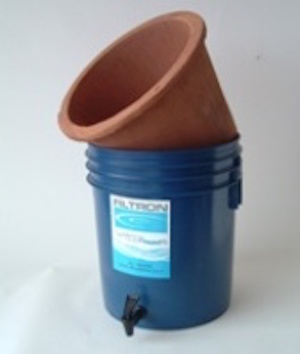Ceramic Water Filter
Potters for Peace
Solution Overview & Benefits
The colloidal silver-enhanced ceramic water purifier (CWP) is a simple, pressed bucket shape 11 in. wide by 10 in. deep, made with a mix of local terra-cotta clay and sawdust or other combustible materials, such as rice husks. The simplest press utilizes a hand-operated hydraulic truck jack and two-piece aluminum mold.
After firing to about 860°c. the filter is coated with colloidal silver. The combination of fine pore size, resulting from milled, screened materials, and the bactericidal properties of colloidal silver produce an effective filter.
A 1.5 to 2.5 liter per hour rate of filtration is determined by the combination of clay/combustible mix and firing temperature.
For use the fired, treated filter element is placed in a five gallon plastic or ceramic receptacle with a lid and faucet. Pricing for ready to use filter units is determined by local production costs and is usually between $15-25 with the basic plastic receptacle.
Replacement filter elements will cost $4 to $6. A basic production facility with three or four workers can produce about fifty filters a day.
Potters for Peace does not operate filter making facilities or sell filters but trains others to do so. Potters for Peace recieves no financial benefit in the form of a percentage of filter sales or in any other manner from the filter producers, the workshops are independent businesses owned by organizations or individuals.
History & Development
Potters for Peace is a member of the World Health Organization’s International Network to Promote Household Water Treatment and Safe Storage.
Since 1998, Potters for Peace has been assisting in the production worldwide of a low-tech, low-cost, colloidal silver-enhanced ceramic water purifier (CWP). Field experience and clinical test results have shown this filter to effectively eliminate approximately 99.88% of most water born disease agents.
The filter design used by PFP was developed by Dr. Fernando Mazariegos of the Central American Industrial Research Institute (ICAITI) in Guatemala, in 1981. The goal was to make bacterially contaminated water safe for the poorest of the poor by developing a low cost filter which could be fabricated at the community level.
In 1994 AFA or Family Foundation of the Americas, a Guatemalan organization, became interested in the ceramic water filter when it was found that other strategies were not yielding effective results. Chlorine tablets in rural communities were not well accepted; health complications associated with chlorine misuse caused additional concern. Boiled water often wasn’t effective when households failed to boil water long enough to purify it. AFA carried out a one year follow-up study on the initial Mazariegos-led filter project, concluding that including this filter into rural health education efforts reduced the incidence of diarrhea in participating households by as much as 50 percent.
In October 1998, Hurricane Mitch tore through Central America. It was one of the most destructive hurricanes ever recorded, affecting millions of people. Safe water was urgently needed as supply systems (already of borderline capacity and efficiency) had been badly damaged. This prompted Potters for Peace to begin a Ceramic Water Filter production workshop in Nicaragua using the Mazariegos design. In the first six months over 5000 filters were distributed through non-governmental organizations. The workshop, called Filtron, evolved into a worker-owned cooperative and is now incorporated as a privately owned business.
Potters for Peace has since provided consultation and training to set up production facilities around the world: Guatemala, Honduras, Mexico, Cambodia, Bangladesh, Ghana, El Salvador, the Darfur region of Sudan, Kenya, Benin, Yemen, Nigeria, Tanzania, Peru, Somaliland and others.
The CWP has been cited by the United Nations’ Appropriate Technology Handbook, and tens of thousands of filters have been distributed worldwide by organizations such as International Federation of the Red Cross and Red Crescent, Doctors Without Borders, UNICEF, Plan International, Project Concern International, Oxfam and USAID.
We have financed or assisted in laboratory testing and field studies of the filter with various institutions, among them: MIT, Tulane University, University of Colorado and University of North Carolina.
Availability
Publicly available: yes
Countries where available: Worldwide
Price (USD): 15-25
Offered or can be licensed for local manufacture: Yes
Specifications
Dimensions: 11" wide x 10" deep
Weight: 15kg
Additional Information
Updates
If you are aware of any updates to the Ceramic Water Filter project please complete the form or send an email to [email protected]
Need help finding solutions that respond to your unique development challenges? Apply through our Project Accelerator service or Contact us directly for needs-based project consulting.
